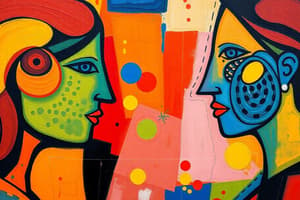Podcast
Questions and Answers
What role does culture play in shaping the self?
What role does culture play in shaping the self?
- Culture influences how one learns and behaves within a society. (correct)
- Culture primarily defines the individual's identity completely.
- Culture solely dictates personal beliefs without any social interaction.
- Culture has no significant effect on the self.
According to George Mead, how is the self constructed?
According to George Mead, how is the self constructed?
- The self is entirely a reflection of societal norms.
- The self is innate and does not change over time.
- The self is formed through social experiences and communication. (correct)
- The self is shaped purely by genetic factors and biology.
What is the 'looking glass self' concept introduced by Charles Cooley?
What is the 'looking glass self' concept introduced by Charles Cooley?
- The belief that self-preservation is the core of identity.
- The idea that self-awareness is achieved without external reflection.
- The theory that the self is shaped solely through introspection.
- The notion that the self develops from our perceptions of others' evaluations. (correct)
Which aspect of the self did Mead identify as spontaneous and unpredictable?
Which aspect of the self did Mead identify as spontaneous and unpredictable?
In the process of socialization, how do individuals interact according to Mead?
In the process of socialization, how do individuals interact according to Mead?
What are the two components of the self according to the dual nature proposed by Mead?
What are the two components of the self according to the dual nature proposed by Mead?
What is a key characteristic of social experience in the context of forming the self?
What is a key characteristic of social experience in the context of forming the self?
How does the 'ME' aspect of the self influence individual behavior?
How does the 'ME' aspect of the self influence individual behavior?
What does William James consider the spiritual self to be?
What does William James consider the spiritual self to be?
What is one characteristic of religion according to the content?
What is one characteristic of religion according to the content?
Which aspect is NOT part of the characteristics of religion?
Which aspect is NOT part of the characteristics of religion?
What role does selective self-presentation play according to Erving Goffman?
What role does selective self-presentation play according to Erving Goffman?
What does the term 'partial identity' refer to?
What does the term 'partial identity' refer to?
Which of the following concepts relates to an individual’s ability to discover meaning in their life?
Which of the following concepts relates to an individual’s ability to discover meaning in their life?
What are the two main forces that interact in the development of an individual?
What are the two main forces that interact in the development of an individual?
What is NOT one of the purposes of rituals mentioned in the content?
What is NOT one of the purposes of rituals mentioned in the content?
What is meant by solitary behavior in the context of sexual behavior?
What is meant by solitary behavior in the context of sexual behavior?
What challenge does the spiritual self face according to the content?
What challenge does the spiritual self face according to the content?
Which of the following best describes socio-sexual behavior?
Which of the following best describes socio-sexual behavior?
What is a significant challenge related to societal expectations of physical beauty?
What is a significant challenge related to societal expectations of physical beauty?
How does cultural practice influence individual sexual behavior?
How does cultural practice influence individual sexual behavior?
What role does environmental conditioning play in human sexual behavior?
What role does environmental conditioning play in human sexual behavior?
Which factor is NOT included in the definition of environment?
Which factor is NOT included in the definition of environment?
What is a consequence of frequent exposure to sexual stimuli, particularly during adolescence?
What is a consequence of frequent exposure to sexual stimuli, particularly during adolescence?
How is the self influenced according to cultural identity theory?
How is the self influenced according to cultural identity theory?
What does the self need to adjust to in order to find its identity?
What does the self need to adjust to in order to find its identity?
What primarily shapes human behavior according to sociology?
What primarily shapes human behavior according to sociology?
What helps define an individual’s cultural identity?
What helps define an individual’s cultural identity?
How does culture influence behavior according to the content?
How does culture influence behavior according to the content?
What does the interaction between individuals from similar cultures typically result in?
What does the interaction between individuals from similar cultures typically result in?
What is one of the significant insights of anthropology regarding the self?
What is one of the significant insights of anthropology regarding the self?
What is implied by the statement that the self is embedded in culture?
What is implied by the statement that the self is embedded in culture?
Which self-presentation strategy aims to influence others by becoming more likeable?
Which self-presentation strategy aims to influence others by becoming more likeable?
Which strategy involves presenting oneself in a humble manner while downplaying achievements?
Which strategy involves presenting oneself in a humble manner while downplaying achievements?
What is the primary goal of self-promotion in a digital context?
What is the primary goal of self-promotion in a digital context?
Which self-presentation approach aims to induce others to view oneself as moral and virtuous?
Which self-presentation approach aims to induce others to view oneself as moral and virtuous?
What is the phenomenon of 'over sharing' in the context of digital identity?
What is the phenomenon of 'over sharing' in the context of digital identity?
Which self-presentation strategy relies on inducing fear to gain power over others?
Which self-presentation strategy relies on inducing fear to gain power over others?
What does the self-presentation technique of supplication involve?
What does the self-presentation technique of supplication involve?
In the digital world, how do individuals generally differ in behavior between online and offline identities?
In the digital world, how do individuals generally differ in behavior between online and offline identities?
Flashcards are hidden until you start studying
Study Notes
The Self in Culture
- The self is shaped by social pressures and the individual's cultural environment.
- Culture encompasses shared values, beliefs, and norms that influence learning, living, and behavior.
- The cultural identity theory explains how individuals act and behave based on their cultural background, including race, gender, nationality, religion, ethnicity, and language.
Sociological Perspective of the Self
- The self is socially constructed through interactions with others.
- Individuals influence the process of shaping their self through their own actions and experiences.
- George Mead's theory believes that the self emerges from social experiences and communication.
- The 'I' represents spontaneity and individuality, while the 'Me' reflects the internalized societal expectations and norms.
The Looking-Glass Self
- Charles Cooley proposed that the self-perception is based on how we believe others see and evaluate us.
Challenges of the Physical Self
- Societal expectations and cultural practices influence how individuals perceive and care for their bodies, including notions of physical beauty and attractiveness.
- Human sexual behavior is influenced by both solitary and socio-sexual activities.
- Solitary behavior includes self-gratification, which can be challenging in an environment saturated with sexual stimuli.
- Socio-sexual behavior involves interactions between individuals, leading to courtship and mate selection.
The Spiritual Self
- The spiritual self is the most intimate and subjective aspect of the self, dealing with a sense of purpose, meaning, and connection to something greater.
- William James defined the spiritual self as the inner experience of moral sensibility, conscience, and intellectual abilities.
- Religion, with its belief in supernatural beings, sacred rituals, and worldview, plays a role in shaping spiritual self.
- Challenges to the spiritual self include questioning the power of a supreme being and facing limitations on one's spiritual control.
The Digital Self
- Online identity is the sum of characteristics and interactions that individuals present online.
- Partial identity is a subset of one's characteristics that are shared online, often carefully selected for self-presentation.
- Selective self-presentation and impression management involve controlling how one is perceived online.
- Erving Goffman's work on self-presentation helps us understand how individuals manipulate their online image.
- Examples of impression management strategies include:
- Ingratiation: Flattering others to increase their self-esteem.
- Modesty: Presenting oneself humbly despite achievements.
- Self-Promotion: Highlighting positive traits and accomplishments.
- Exemplification: Demonstrating virtuous behavior to be perceived as morally upright.
- Intimidation: Projecting power and danger to gain influence.
- Supplication: Appearing weak or dependent to solicit sympathy and help.
Challenges of the Digital Self
- "Over-sharing" personal information online can lead to unintended consequences.
- The lack of clear boundaries between public and private information in the digital world poses a challenge to managing one's online identity.
- The emphasis on self-presentation can result in a disconnect between one's online and offline identities.
Studying That Suits You
Use AI to generate personalized quizzes and flashcards to suit your learning preferences.




